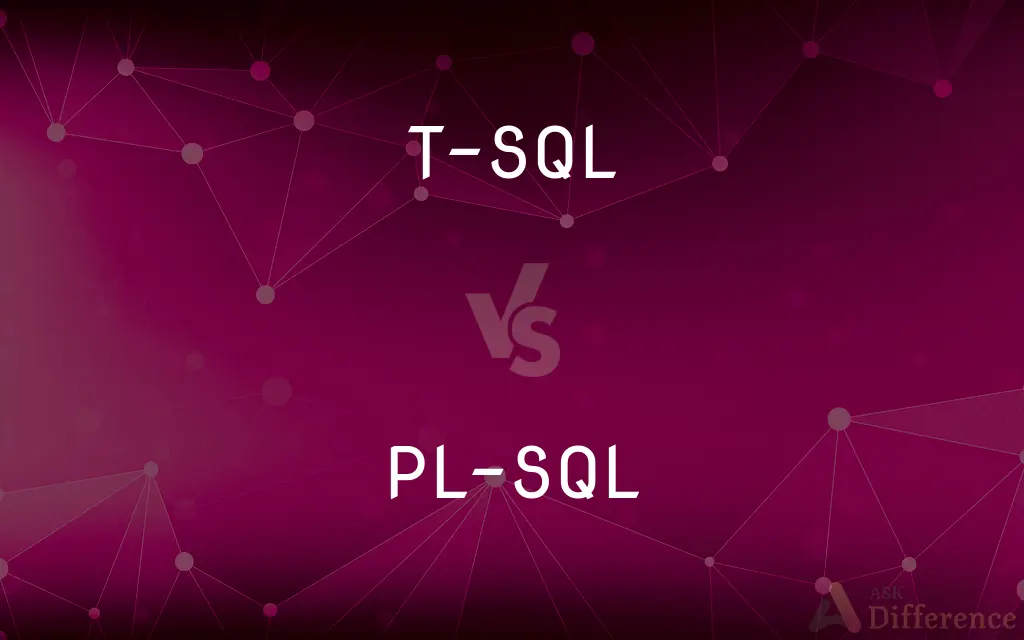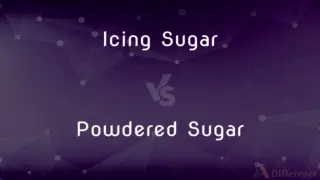T-SQL vs. PL-SQL — What's the Difference?
By Tayyaba Rehman — Published on January 9, 2024
T-SQL (Transact-SQL) is Microsoft's SQL dialect, expanding SQL's capabilities. PL-SQL (Procedural Language/Structured Query Language) is Oracle's SQL extension, integrating procedural language elements for complex tasks.

Difference Between T-SQL and PL-SQL
Table of Contents
ADVERTISEMENT
Key Differences
T-SQL, Microsoft's SQL variant, aids database management, offering stored procedures. PL-SQL, Oracle's SQL extension, empowers procedural capabilities for processing tasks within Oracle databases.
In T-SQL, advanced functions streamline data retrieval and manipulation, enriching SQL's capabilities. PL-SQL intertwines procedural constructs, enhancing Oracle databases with loops and conditions for complex processing.
T-SQL emphasizes optimization for Microsoft SQL Server, allowing for efficient data handling. PL-SQL integrates tightly with Oracle databases, enabling robust procedural features and enhancing database performance.
T-SQL incorporates features like error handling and transaction control, augmenting SQL's efficiency. PL-SQL provides powerful block structures, enabling developers to handle complex data manipulations within Oracle databases.
T-SQL provides comprehensive tools for querying and managing Microsoft SQL Server databases. PL-SQL offers Oracle-specific advantages, integrating tightly with Oracle databases for advanced data processing tasks.
ADVERTISEMENT
Comparison Chart
Origin
Microsoft's SQL dialect
Oracle's SQL extension
Purpose
Database management and querying
Procedural capabilities in Oracle databases
Features
Stored procedures, advanced functions
Procedural constructs, loops, and conditions
Optimization
Focuses on Microsoft SQL Server
Tightly integrates with Oracle databases
Tools
Efficient data handling in SQL Server
Advanced data manipulation within Oracle
Compare with Definitions
T-SQL
Microsoft's SQL variant supporting stored procedures.
T-SQL simplifies database tasks with stored procedures.
PL-SQL
Tight integration enhancing Oracle database performance.
PL-SQL's integration boosts Oracle database efficiency.
T-SQL
Provides tools for managing Microsoft SQL Server databases.
Using T-SQL, administrators optimize SQL Server.
PL-SQL
Oracle's SQL extension integrating procedural elements.
PL-SQL adds procedural power to Oracle databases.
T-SQL
Includes error handling and transaction controls.
T-SQL's error handling improves database stability.
PL-SQL
Provides block structures for handling complex data tasks.
PL-SQL's blocks streamline intricate data manipulations.
T-SQL
Enables complex data queries with advanced functions.
T-SQL's functions simplify intricate data operations.
PL-SQL
Empowers developers with loops and conditional statements.
Using PL-SQL, complex tasks in Oracle are simplified.
T-SQL
Expands SQL capabilities for efficient data manipulation.
Writing T-SQL queries speeds up data retrieval.
PL-SQL
Integrates procedural constructs within Oracle databases.
Developers use PL-SQL for advanced Oracle data processing.
Common Curiosities
What are PL-SQL's advantages over standard SQL?
PL-SQL includes procedural constructs like loops and conditions, enabling more complex and customizable processing within Oracle databases.
Are there significant differences between standard SQL and T-SQL?
Yes, T-SQL includes Microsoft-specific enhancements like stored procedures and additional functions not present in standard SQL.
Is T-SQL only for Microsoft SQL Server?
Yes, T-SQL is primarily designed for use with Microsoft SQL Server.
Can PL-SQL be used outside Oracle databases?
No, PL-SQL is specifically tailored for Oracle databases and isn't widely compatible with other systems.
Does PL-SQL support error handling mechanisms?
Yes, PL-SQL includes error handling capabilities, allowing developers to manage exceptions within Oracle databases.
What are the key components of PL-SQL's block structures?
PL-SQL blocks consist of declarations, executable statements, and exception handling.
How can T-SQL contribute to improving database performance?
T-SQL's efficient data handling and optimization tools aid in enhancing SQL Server's overall performance.
How does PL-SQL handle exceptions?
PL-SQL offers robust exception handling mechanisms, allowing developers to manage errors and exceptions gracefully.
How does T-SQL enhance SQL's capabilities?
T-SQL adds functionalities like stored procedures and advanced functions, enriching SQL for better data handling.
Can PL-SQL be used for performance optimization in Oracle databases?
Yes, PL-SQL's tight integration with Oracle databases allows for better performance optimization through procedural constructs.
Can T-SQL be used for complex data manipulations?
Absolutely, T-SQL's advanced functions facilitate intricate data operations and complex queries.
How does T-SQL aid database administrators?
T-SQL provides tools for managing SQL Server databases efficiently, enabling administrators to optimize and streamline database tasks.
Are there limitations to using PL-SQL in Oracle databases?
While powerful, improper use of PL-SQL constructs can impact database performance, requiring careful programming practices.
Can T-SQL be used for developing scalable applications?
Yes, T-SQL's stored procedures and functions contribute to building scalable applications by optimizing data operations and queries.
Can T-SQL statements be nested?
Yes, T-SQL allows for nesting statements, aiding in performing complex tasks within SQL Server databases.
Share Your Discovery

Previous Comparison
Systematic Risk vs. Unsystematic Risk
Next Comparison
Icing Sugar vs. Powdered SugarAuthor Spotlight
Written by
Tayyaba RehmanTayyaba Rehman is a distinguished writer, currently serving as a primary contributor to askdifference.com. As a researcher in semantics and etymology, Tayyaba's passion for the complexity of languages and their distinctions has found a perfect home on the platform. Tayyaba delves into the intricacies of language, distinguishing between commonly confused words and phrases, thereby providing clarity for readers worldwide.














































